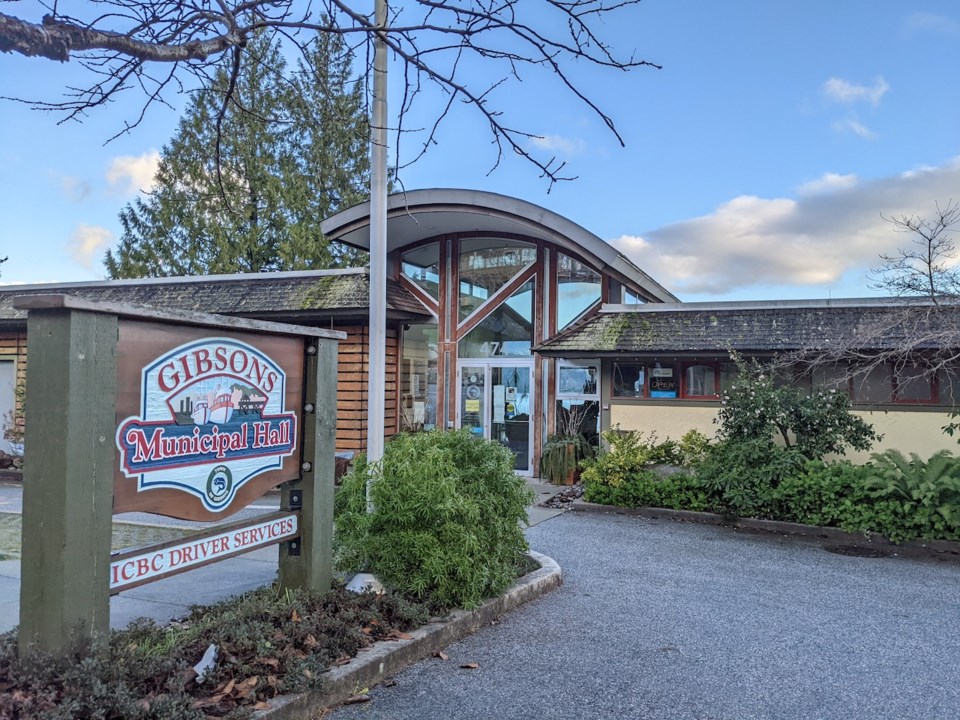As he starts his term, Gibsons Mayor Silas White is throwing the procedure book out the window – or at least rewriting it.
At its first regular meeting on Nov. 15, the new Town of Gibsons Council passed three readings of revisions to the Procedures Bylaw that would see regular meetings reduced to once a month (rather than twice a month), eliminate a bylaw-set order of proceedings and limit delegations to one per meeting, among other amendments.
“We tried not to make anything too substantive but some of these could have a substantive impact,” corporate officer Rebecca Anderson told council.
Standard order of business
Council meetings would take place the first Tuesday of every month and any further meetings would be special council meetings. White explained that the council meeting would be focused on “decision making” – and hopefully be shorter than is currently typical. It was noted that while the notification period required for public meetings is two weeks, for special meetings it is merely 24 hours.
A standard order of business is not legislatively required Anderson said, but “it is a best practice to lay it out.” She asked for direction from council on whether they wished to have some prescribed order or have it omitted entirely.
White commented, “I don't see that as a best practice to have an order of proceedings. It's commonplace practice, for sure,” he said. “I find most local governments don't actually follow their own procedural bylaw or not, they're not actually following those orders. So it's very cumbersome.”
White spoke in favour of flexibility with agendas and the ability to bring important items to the top of the agenda.
Coun. David Croal said he always considered the order of proceedings as more of a guide for staff.
“A guide for staff is great, but when it’s in a bylaw, it’s actually technically..the law,” said White, suggesting it may be better as a policy. He later told Coast Reporter, “It’s kind of misleading, having a procedures bylaw that claims that there’s an order of proceedings that is followed every single meeting when there isn’t.”
Public Inquiries
Youth Councillor Colton Rockford asked if the order of proceedings change would remove or potentially remove the chance for public input (the bylaw-mandated order has a public comments session at the beginning of the meeting and inquiries at the end.)
“We have flexibility to continue to include that. But we're talking as a council about how to how to best deal with public engagement with the community,” said White. He called the public inquiries sessions of his last council term (2014-2018) “very unsatisfactory” and “very confrontational.”
“I’m really committed to trying to find something that works better to get the community together for some two-way dialogue and also ways that people get their answers.”
Asked about public participation amid changing the public inquiry process, White said they’re going to need to do a lot more work as a council, and pointed to the public information session about short-term rentals the council agreed earlier that meeting to hold.
Talking with Coast Reporter, White explained that he envisions moving much of the discussion that happens in council meetings currently to other kinds of meetings, like committees of the whole and public dialogue sessions. He’d welcome more delegations at such meetings rather than council. “I really want to change to a model where we have a lot of public engagement, a lot of public discussion on issues, including even developments, before they come to council.
“When people ask questions in meetings, a lot of the time the only answer I'm going to be able to give them is, I’ll ask staff to look into it. Which I could do in an email.”
Regular meetings vs. special meetings
At the council meeting, Coun. Annemarie De Andrade asked for clarity on how having one council meeting a month could work as her experience has been that every agenda has many items.
“That is exactly what I have in mind,” said White. “If we can have more efficient council meetings that are focused on decision making…and not trying to make them double as a public engagement session, which is something we were advised [at our orientation session], it’ll open up space for us to be able to have more dialogue with the community with some public participation sessions.
“We need to make space for some of these important conversations in our community. And that's, that's why I'm suggesting we have one meeting really focused on decision making. And try to build up around there based on what this council's priorities are.”
White also noted the burnout among local government politicians and the demands marathon meetings place on them.
De Andrade inquired about the difference between a special meeting and a regular meeting and asked, what is going to change?
“We can easily go be resistant to change…. it's very common, discomfort with change. But I'm really hoping that we can give it a shot,” answered White. “And we can change back.
“Special meetings, they're very focused on the items we need to get done.”
Coun. Stafford Lumley spoke in favour of the change – ”I think the staff will benefit, because they'll be able to concisely report to us, and they'll be on pertinent subjects and have the appropriate time to make the reports. Instead of trying to rush out two reports in a month.
“I'm kind of excited to see what happens and the amount of work that we can get done.”
Some other changes in the procedures bylaw are to adapt to the post-COVID world of hybrid meetings (which Anderson said should be possible soon).
The three readings passed unanimously and the bylaw just needs to pass adoption.



